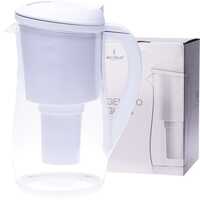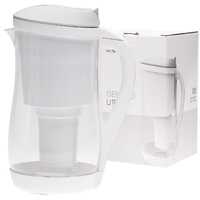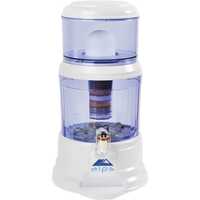As the foundation of human health, water helps you to stay alive and function at an optimal level. Consisting of two parts hydrogen and one part oxygen, water is a clear inorganic substance that's largely defined by what it is not. Water has no colour, no odour, and no calories, yet it's vital for all forms of life. It provides no food or energy to the body, but it helps to keep us alive. Despite its lack of substance, water is an essential nutrient that makes up 50-80% of your body and 50-60% of its weight.
The regular consumption of water is key to good health, but the quality of modern water can be compromised. Let's take a deep dive into water, including its many benefits, potential issues, and filtering options.
What Exactly is Water Anyway?
Water is a polar inorganic chemical substance that makes up the fluids of all living organisms. Often called the "universal solvent," water is able to dissolve a wide array of substances. In fact, the water found in nature almost always contains other substances, with special steps needed to make chemically pure water. While these steps are designed to make water safe, they often take out useful minerals and add potentially unwanted chemicals.
Water has a wide range of unique properties, and it is the only common substance to exist as a solid, liquid, and gas. The natural water cycle of evaporation, precipitation, and runoff controls these states to manage water resources and ensure adequate supply. Water is often stored in lakes and dams, and it's made fit for human consumption through the process of filtration or distillation. Safe or potable water typically contains chlorine, with fluoride also added to many water supplies.
How Much Water Should You Drink?
While most people would survive without food for roughly 40 days, you can't go more than 72 hours without drinking water. Under healthy conditions, the average adult body contains around 35-45 litres of water, including 2 litres in your cells and 12-15 litres in your blood vessels, tissues, and organs. To maintain a healthy level of water throughout your body, you need to drink it on a regular basis.
According to official Australian health guidelines, the following levels of water intake are recommended each day. One cup is measured at 250 ml.
- Adult men – 10 cups
- Adult women – 8 cups
- Children – 4-6 cups
- Teenagers – 6-8 cups
While babies don't need to drink pure water, they require 0.7-0.8 litres of fluid from breast milk or formula. While you don't have to drink cup after cup of pure water to reach these levels, filtered tap water is often the best choice. It's always best to drink water before you feel thirsty, and keep an eye on the colour of your urine to make sure you're adequately hydrated.
You can also drink tea, coffee, fruit juice, and soft drinks to make up your recommended water intake, but each of these options has disadvantages. Tea and coffee contain caffeine, and fruit juice and soft drinks contain high levels of sugar. While alcoholic beverages do make a positive contribution to total fluid consumption, they are not normally measured in daily intake levels. If you do drink alcohol, however, you may need to drink more water to avoid dehydration.
Benefits of Drinking Water
Water is vital to life and necessary for all chemical reactions in our bodies. Among other things, it's essential for energy regulation, nutrient transportation, healthy digestion, body temperature regulation, and waste disposal. Water is a key component of saliva, and it helps to filter out toxins from your skin and throughout your body.
The following benefits are key:
- Transports nutrients around your body
- Protects your organs and tissues
- Makes hormones and neurotransmitters
- Delivers oxygen throughout your body
- Regulates body temperature
- Normalises blood pressure
- Lubricates joints
- Aids the digestive system
- Removes bacteria from your bladder
- Filters out toxins
- Prevents constipation
- Promotes healthy skin
- Essential to mouth health
Problems From Not Drinking Enough Water
If you don't drink enough water, you risk several health problems. From relatively mild symptoms like tiredness and irritability to potentially serious conditions such as urinary tract infections and colon cancer, dehydration can create numerous issues. While drinking enough water is crucial for people of all ages, older people are at greater risk of dehydration if their kidneys stop working properly or the normal thirst mechanism fails for other reasons.
Insufficient water intake makes the following problems more likely:
- Reduced physical performance
- Reduced mental performance
- Dizziness and fainting
- Constipation
- Urinary tract infections
- Kidney stones
- Colon cancer
Issues with Modern Water
Despite all the benefits of water consumption, there are potential issues with the quality of modern water. The industrialised world produces a huge range of toxic substances, many of which make their way into water bodies. Population and infrastructure issues also have an impact on water quality, with much of the world's human waste pumped back into the natural water cycle. There are also huge issues with water security in some parts of the world, as growing water scarcity brought on by climate change threatens already fragile distribution systems.
The following issues affect water quality across the world:
- Human sewage
- Groundwater pollution
- Climate change
- Water security
- Agricultural pesticides
- PFAS and household chemicals
Water treatment plants are standard across the western world, with public infrastructure used to implement various water treatment methods. While public water is well controlled and safe to drink, the following steps highlight a number of potential problems:
- Coagulation adds chemicals with a positive charge to neutralise the negative charge of dirt.
- Flocculation involves mixing water to form larger particles, often through the addition of chemicals.
- Sedimentation separates water from solids.
- Filtration uses various filtering materials to remove dissolved particles and germs.
- Disinfection adds one or more chemicals to kill parasites, such as chlorine, chloramine, and chlorine dioxide.
- Fluoridation is the addition or controlled adjustment of fluoride solely to reduce tooth decay.
Public water treatment is great at removing germs, but there are potential issues associated with these steps. From the removal of naturally occurring minerals to extreme acidity and the addition of chemicals, the water we drink on a daily basis is not ideal. While people living in the western world are very well-placed by global standards, additional home-based water filtering is the best way to ensure optimal water quality.
Benefits of Water Filters
Home-based water filters, including water filter jugs, use a variety of processes to remove unwanted substances from water, including sieving, adsorption, ion exchanges, and biofilms. Along with filtering out the nasties, they may also add minerals and change the pH of water to make it more alkaline.
There are many home-based water filters on the market, all of which offer one or more of the following benefits:
Removes chlorine
Some water filters have the ability to remove chlorine through activated carbon and other methods. While chlorine is an important part of water treatment, recent studies into chlorine intake have caused some concern. While the low chlorine levels in treated water are thought to be safe for human consumption, this chemical element has been linked to a range of health problems. Recent studies highlight links between chlorinated water and skin rash, intestinal symptoms, and arthritis, among other conditions. Chlorine in water has also been linked with colon cancer, along with a higher total risk of combined cancers.
Removes fluoride
Some water filters can take out or neutralise fluoride from your drinking water. Fluoride is a basic element that's widely distributed across the environment, including natural water sources. Fluoride is also added to treated water in many places, although this remains a controversial public health measure. Artificial fluoridation is designed to boost oral health, and it's great in the fight against tooth decay. However, fluoride consumption has also been linked with a variety of health conditions, including bone formation, cancer, and poor cognitive development.
Adds beneficial minerals
Along with providing a second layer of protection against harmful bacteria, water filter jugs and other home-based filters use silica and mineral sands to replenish some of the minerals lost during public water treatment. When combined with a healthy diet, the nutrients in water make a small but not negligible contribution to human health. Water filters are a great way to boost your intake of beneficial minerals while filtering out heavy metals and harmful elements.
Alkalises water
Many water filters are designed to make water more alkaline. With a higher pH level than regular drinking water, alkaline water is often promoted as an easy way to achieve optimal health. While more research is needed on water alkalisation, some studies have suggested benefits related to blood flow and hydration. In one study involving mice, the ingestion of alkaline water was even shown to increase longevity. Acidic environments in the body are known to fuel tumour growth, with an alkaline diet showing promise in the fight against various diseases.
Water is essential to human life, but modern water sources and treatment processes are often compromised. If you want to consume the very best water possible, adding a water filter to your home is a great place to start. Healthy Being has a wide range of high-quality water filters in stock, including water filter jugs, replacement filters, and benchtop water filtration units. So check out our website today and enjoy free shipping options across Australia and worldwide delivery!


 Certified Organic
Certified Organic Vegan Friendly
Vegan Friendly  Vegetarian
Vegetarian Organic Ingredients
Organic Ingredients Dairy Free
Dairy Free Gluten Free
Gluten Free Keto Friendly
Keto Friendly

































